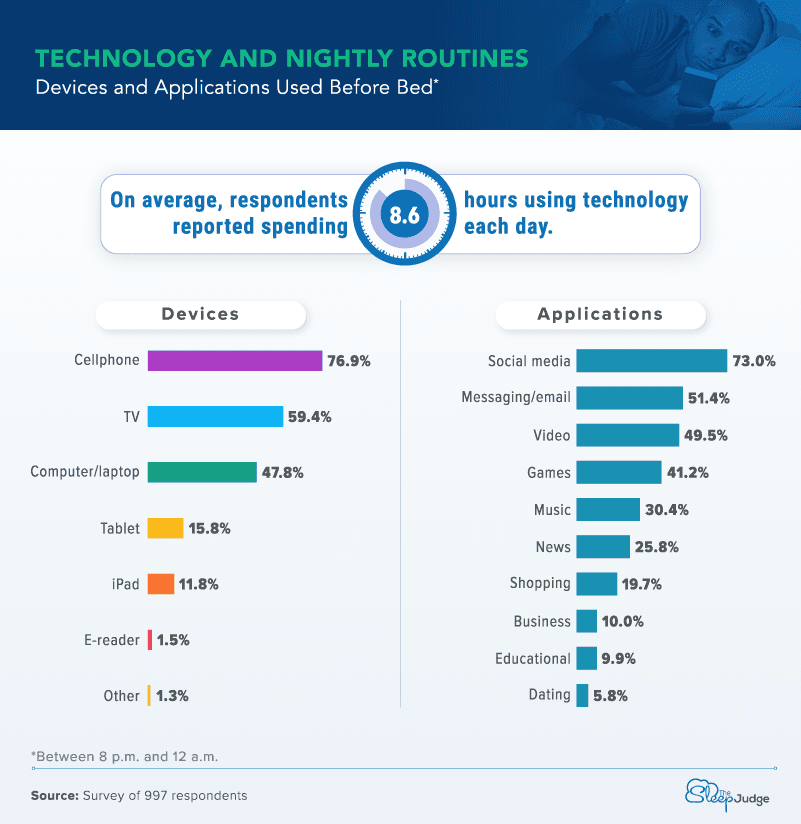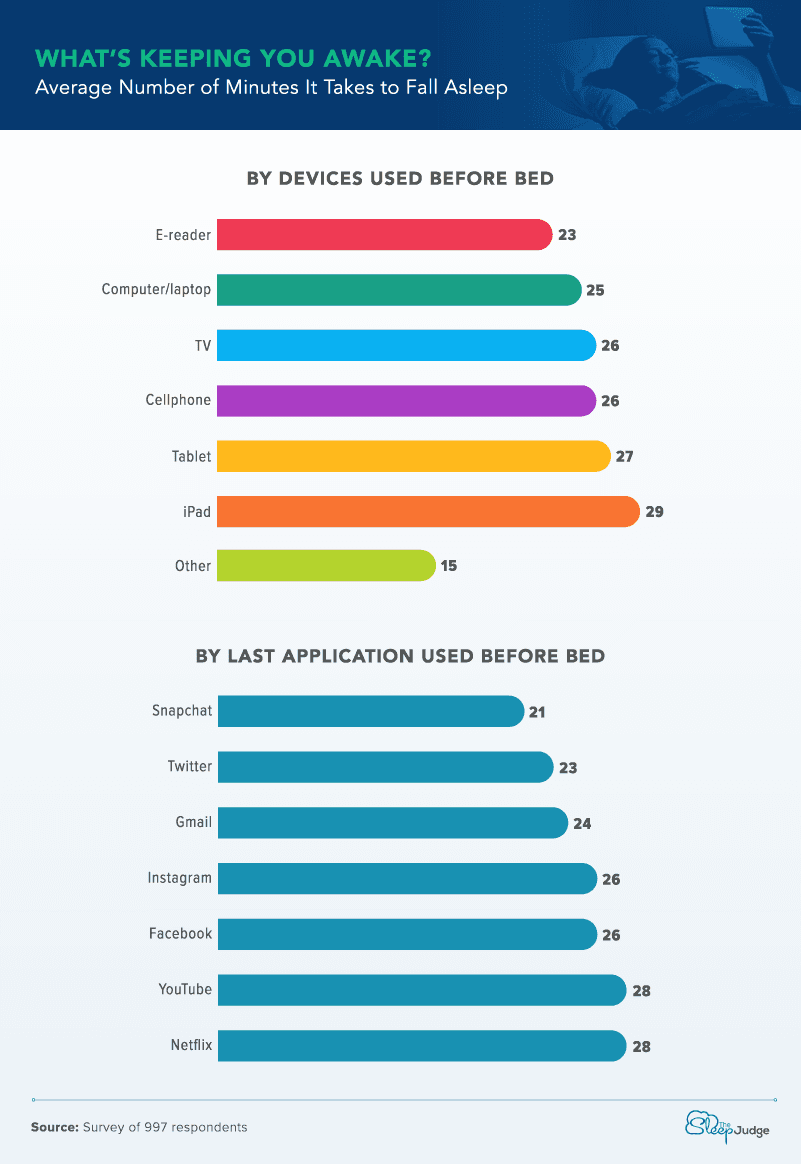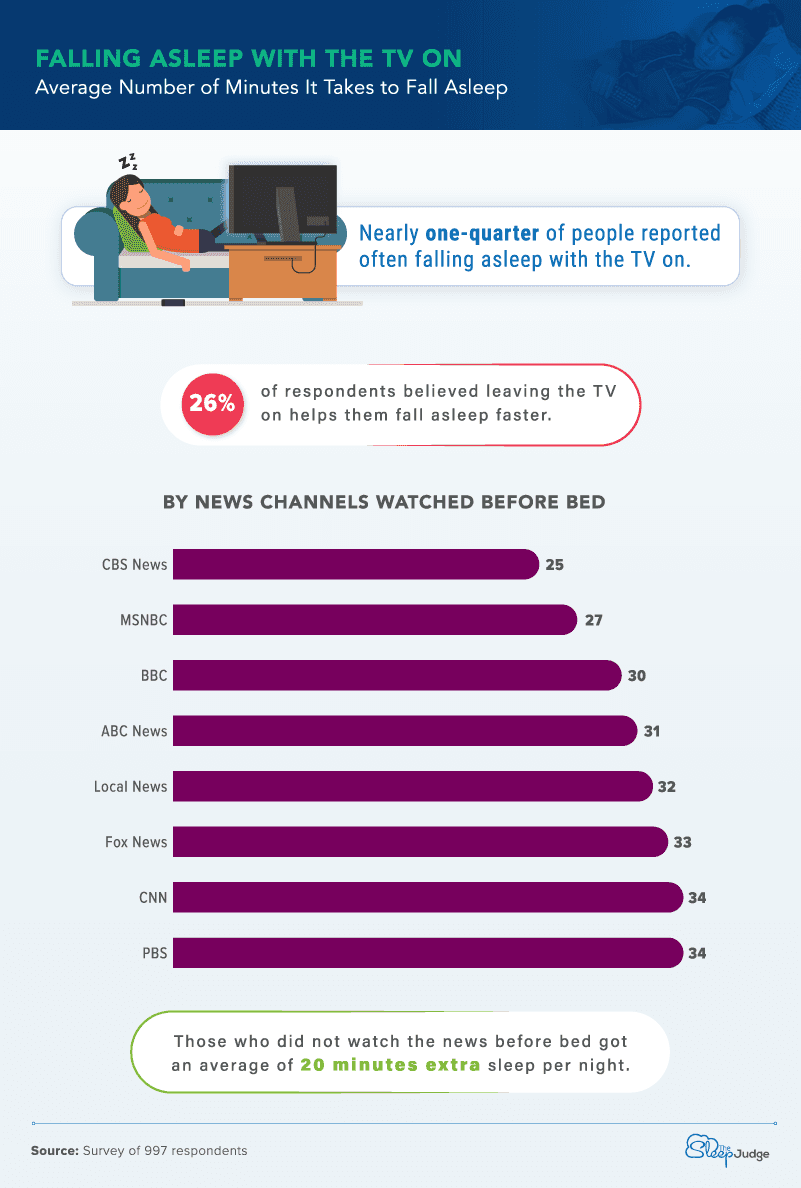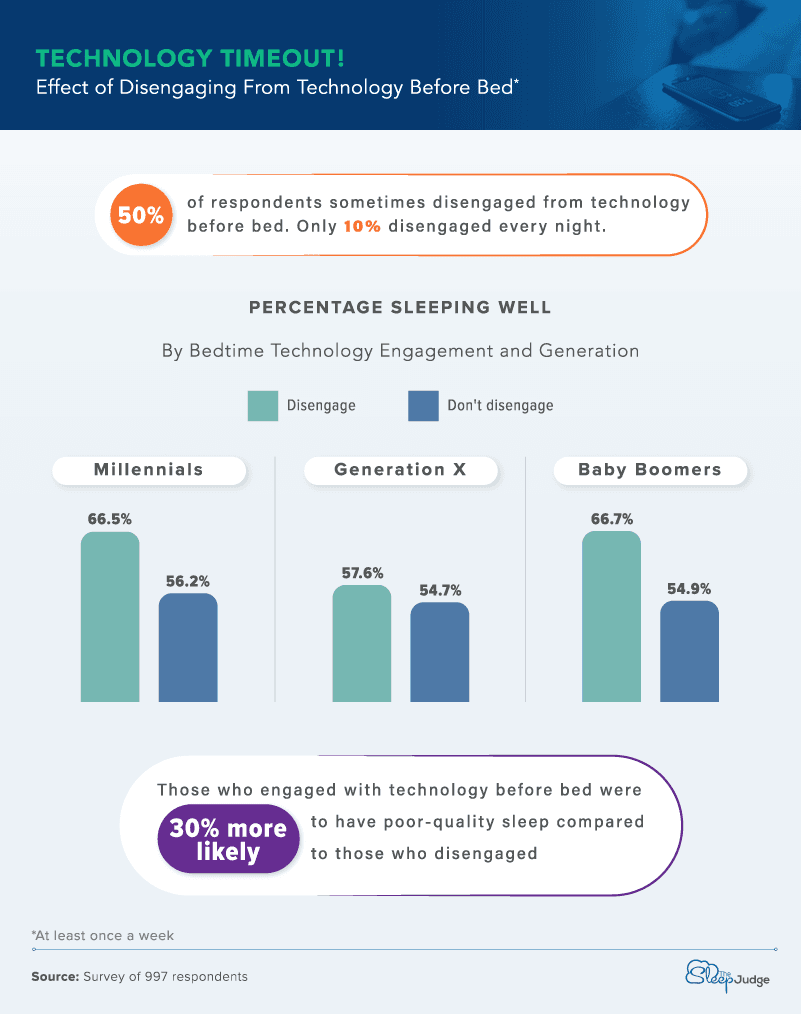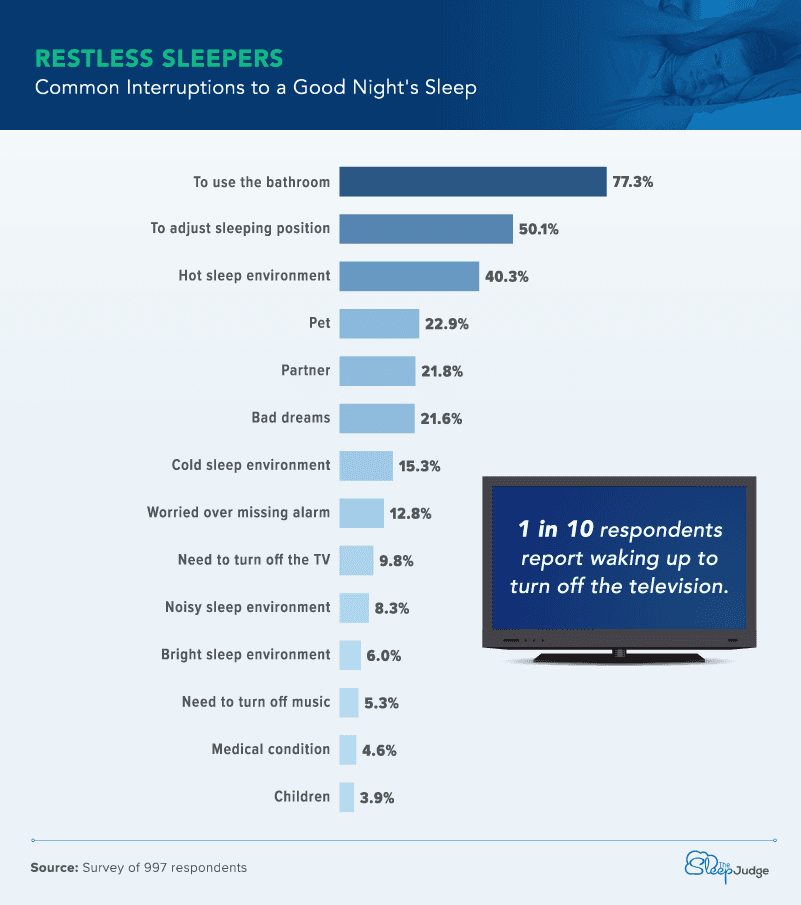padding-top: 15px;
padding-bottom: 5px;
}
By now, you’ve probably heard it a million times, but experts insist you should get anywhere from seven to nine hours of sleep every night to maintain your physical and mental health.
Of course, knowing how much sleep you’re supposed to get and actually clocking in those hours are two very different things.
Instead, we struggle to put our cellphones down and get comfortable in bed. We may even lie awake wondering how Martha Stewart manages on less than four hours a night.
No matter how much you might want to get a good night’s sleep, though, there’s a seemingly endless number of things that will keep you awake if you aren’t careful. For a closer look at how information overload affects sleep quality in America, we surveyed 997 people about their technology habits before bed. Keep reading to see what we found.
Too Much Time Tuned In
Americans, on average, spent more than eight hours every day interacting with technology. While Gen Xers reported the highest usage (8.8 hours), baby boomers (8.3) and millennials (8.7) weren’t far behind. And while we could make the argument that screen time is simply a part of professional life for most people, it wasn’t computers or tablets making up the bulk of respondents’ digital activity before bed: It was cellphones and TVs.
While research suggests that too much technology can impact our memory, emotional stability, vision, ability to sleep at night, and even our heart health, a majority of respondents couldn’t seem to disconnect before bed. Seventy-three percent of people admitted to using social media before trying to fall asleep, followed by messaging or email (over 51%) and video apps (about 50%).
And while reading is often touted as being the healthier bedtime activity, people didn’t get better sleep because they opened a book. Among those who identified sleeping well regularly, less than half read before bed. Still, of those who said they often slept poorly, 61% didn’t make time to read before trying to fall asleep.
Up All Night
Too much technology before bed can be bad for your sleep health, and there’s a reason why. Even though some blue light occurs naturally in our day-to-day activities, an excess of artificial light (including blue wavelengths) suppresses the natural secretion of melatonin, which may lead to shortening sleep habits and an increase of depression, as well as a higher likelihood of diabetes and cardiovascular health concerns.
While technology before bed can cause you to toss and turn at night, some devices may be worse than others. On average, people using their iPads before bed spent 29 minutes falling asleep, and people using other tablets took 27 minutes. Not unlike larger-screen devices, people using cellphones or watching TV immediately before bed needed 26 minutes to fall asleep. Reading may be a good way to drift off, but e-readers played a part in keeping respondents awake for an extra 23 minutes.
People staying up at night to watch videos on their devices experienced the longest wait for sleep at an average of 28 minutes. Those using Facebook (26 minutes), Instagram (26 minutes), or Gmail (24 minutes) typically fell asleep faster than people using video apps before bed.
Can’t Turn It Off
What do you do when it’s time to turn off the lights, but you aren’t entirely ready to go to bed? More than 1 in 4 respondents believed leaving the TV on at night helped them fall asleep faster, but science may not back their claims.
If you’ve got too much on your mind when it’s time to go to sleep, you might think that turning on the TV (especially to something you’ve already seen) will help drown out the noise. Instead, the blue light could be causing you to stay up later and wake up more frequently.
If you’re going to try to watch something before bed, though, you might want to avoid the news. On average, people who didn’t watch the news before bed got an extra 20 minutes of sleep every night. Stations most likely to keep you awake? According to those surveyed, PBS (34 minutes), CNN (34 minutes), and Fox News (33 minutes) made it the hardest to fall asleep.
Patterns of Unplugging
If you’re worried you might be getting too much screen time before bed, you can limit your digital exposure. Try listening to a podcast instead of watching a video or TV, download an application that will regulate your internet usage, or leave your phone in a different room. You might notice that you not only sleep better, but you’re less stressed and more focused.
Across every generation, people making an effort to disengage from technology were more likely to get a better night’s sleep. Although led by millennials and baby boomers (nearly 67%), about 58% of Gen Xers who regularly slept well also acknowledged disconnecting from their devices.
Tossing and Turning
Restless sleep can hinder focus, productivity, and happiness – but disengaging from technology before bed can bring some relief. We found that those who disengaged before bed at least once a week were 11% happier, 11% less groggy, and over 10% more likely to feel rejuvenated than those who hadn’t.
Even if you get to bed at a decent hour and try to do everything right to ensure you get the best sleep possible, you may wake up feeling tired and stressed out. If you aren’t staying fully asleep through the night, you might be disturbing your REM sleep cycles, harming your body’s overall sleep health.
On average, people only slept through the night three times a week, while those who made an effort to disconnect from their devices slept through the night four times a week. Needing to go to the bathroom (77%) was the leading cause of restless sleep, followed by needing to adjust the sleep position (50%), feeling too hot at night (40%), and a noisy pet (23%). In addition to helping you find the most comfortable position for a restful night of sleep, the right mattress can help you regulate your sleep temperature more effectively.
Rested and Recuperated
On average, respondents spent nearly nine hours every day interacting with their devices. In some cases, this included right up until the moment they closed their eyes and tried to fall asleep. From social media apps to email or messages, the information overload caused them to stay up later than intended. Some devices, including iPads and other tablets, made falling asleep even more difficult, as did watching TV or other video content before bed.
At The Sleep Judge, we’re passionate about sleep. Our expert reviews and sleep resources are designed to help you get better sleep the moment your head hits the pillow. With reviews on all the best mattresses, mattress toppers, pillows, and anti-snoring devices on the market, we’re fully equipped for your rest and wellness. To learn more, visit us at TheSleepJudge.com today.
Methodology and Limitations
There were 997 respondents from Amazon’s Mechanical Turk. The respondents who were excluded missed an attention-check question or indicated they did not frequently use devices such as the TV, cellphones, computers, etc. Throughout the survey, any outliers were excluded from our data. Of the eligible respondents, 48% were men, and 52% were women. Our respondents ranged in age from 18 to 87 with a mean of 34 and a standard deviation of 11.95.
Limitations: The data we are presenting are self-reported. There are many issues with self-reported data. These issues include but are not limited to selective memory, telescoping, attribution, and exaggeration. As a result, the outliers in this study have been excluded.
Our findings are not attempting to make any claims of causation. We are simply pointing out the correlations observed in respondents between a healthy abstention from technology before bed and better perceived sleep and wakefulness outcomes.
Fair Use Statement
We don’t encourage sending this study past bedtime, but we encourage you to share the results with your audience for any noncommercial use. Before you unplug completely, make sure to include a link back to this page so that your readers can see our full analysis.

